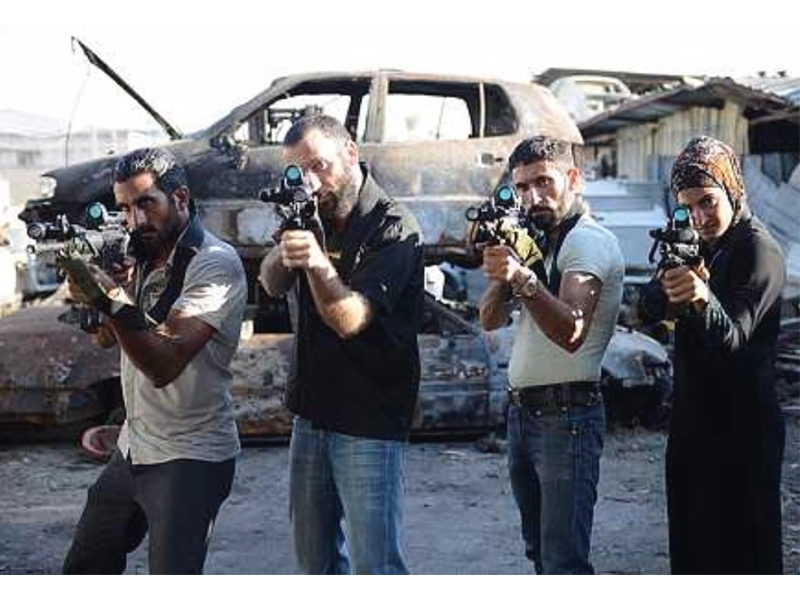Israeli television has been seriously good for a while now, as anyone who’s followed the trajectory of homegrown Israeli dramas like Hatufim, successfully adapted a year after its 2010 release to the critically-acclaimed American variation, Homeland, can attest.
North American viewers should therefore be taking note of the latest political thriller to make serious waves in Israel, both for its high quality and unique subject matter.
Fauda, which Torontonians will have a chance to watch over the course of three screenings – the first held Nov. 15 – at Innis Town Hall and presented by the Toronto Jewish Film Festival in partnership with the Anne Tanenbaum Centre for Jewish Studies, is being hailed as the first Israeli drama to explore both the Israeli and Palestinian experience of the regional conflict.
Fauda “Next” Trailer from Israel Avitbul Director/Editor on Vimeo.
Written and developed by Lior Raz (who also plays the show’s protagonist, Doron) and Avi Issacharoff, Fauda, which premiered in Israel in February, is about an elite, undercover counter-terrorist unit in the Israel Defence Forces that frequently poses as Arabs and undertakes covert military operations in the West Bank.
Immersed in Arabic and Palestinian culture and mores, the team, which the premiere season’s 12 episodes are centred on, endeavours to find and kill the seemingly indomitable Hamas terrorist, Abu Ahmad, or “the Panther,” played by Palestinian Israeli actor Hisham Suliman.
Specifically, the focus falls on the team’s commander, Doron, who has been wooed back to the unit, largely by his own demons, from a brief foray into civilian life.
The show follows as he forgoes the fragile domestic life he’s built and devotes all he has to trying to defeat Abu Ahmad, the man it was widely believe he’d killed 18 months prior.
What’s most compelling about Fauda (which translates, in Arabic, to “chaos”) is that the personal challenges and tragedies of Doron and the men in his unit – who are, not surprisingly, revealed to be far more entwined in their various dramas and betrayals than first meets the eye – are shown alongside those of Abu Ahmad and his tight-knit network of family, supporters and friends.
While frankly it seems bizarre, not to mention long-overdue, that an Israeli program hasn’t until now showcased the other side of the Israeli-Palestinian conflict, Fauda has been lauded for its extensive use of Arabic (the show is fairly evenly split where Hebrew and Arabic language are concerned) and portrayal of Hamas operatives, and their families as complex and, often, compassionate human beings coping with their own internal struggles and desires to protect those they love.
Though overall it still skews towards emphasizing the Israeli characters’ lives in greater detail – and with greater nuance – a number of the Palestinian characters are finely drawn and deeply empathetic.
Abu Ahmad’s sister-in-law, for example, who watches while her new husband is gunned down before her eyes in the midst of their wedding celebration, is extremely sympathetic to behold as she transforms from a hopeful and eminently vital young woman in love to one overtaken by anger, hopelessness and grief.
The violent actions she subsequently takes are depicted more than anything as heartrending, as opposed to enraging.
Then there’s Shirin, the Palestinian doctor and cousin of Abu Ahmad’s right hand man, who is unwittingly drawn into the web of duplicity and violence as, beneath the double-dealing, a kernel of authentic connection is forged between her and Doron.
Even Abu Ahmad himself is positioned, in many ways, in a sympathetic light, the fierce love he has for his family frequently highlighted.
A scene wherein he and his wife – who his underground life has long kept him separate from -– are reunited, is affecting to some extent although here the script would have benefited from some stronger, more imaginative writing and greater depth.
Ultimately, Fauda delivers insofar as, in many ways, it exposes the fluidity and the fissures of the boundaries, both physical and social, that have been erected between Palestinians and Israelis: Doron’s unit simply need put on different clothes and switch to Arabic and they are taken for Palestinians.
The reverse is shown when a Palestinian character takes her hair down, dons a pair of tight jeans and easily passes as an Israeli woman in a Tel Aviv bar.
In this way, Fauda makes sure the tragic irony of two peoples who are at once wretchedly divided and closely related, is keenly felt, regardless of one’s politics.







